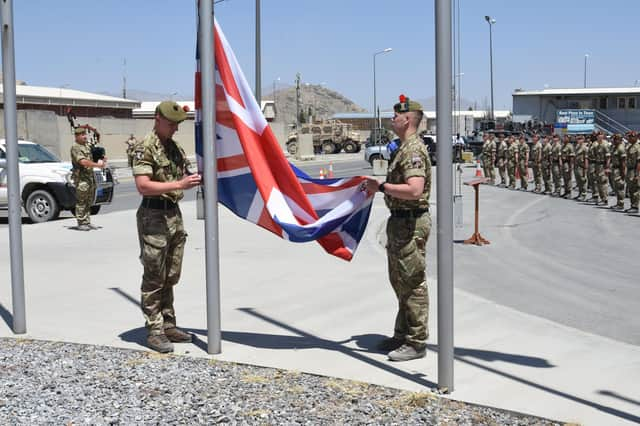The huge costs of Britain’s rushed exit from Afghanistan – Professor Tim Willasey-Wilsey


The two situations are, of course, very different. The British departure from India and Pakistan marked the necessary end to a colonial era which had lasted more than two centuries. Large crowds were there to cheer their going but it was good-natured and there were no serious concerns that the soldiers would be in danger. In fact the Illustrated London News showed them in their kilts with bayonets fixed marching past the founder of Pakistan Mohammed Ali Jinnah. The Dundee Courier quoted Jinnah as saying; “Although you are leaving Pakistan, the people of Pakistan and I will always have the best goodwill for your nation”.
Seventy-three years later the Black Watch climbed aboard a transport aircraft after a short ceremony to commemorate the 456 British men and women who lost their lives in the 20-year conflict in Afghanistan caused by the 9/11 terrorist attacks. It would have been far too dangerous for them to parade through Kabul; a city which is increasingly infiltrated by Taleban insurgents and where the local population see Nato’s sudden departure as an act of betrayal. There would be no cheering.
Advertisement
Hide AdAdvertisement
Hide AdThere will be plenty of time to rake over the ashes of our latest, and presumably last, Afghan imbroglio. How on earth did a successful, and highly popular, intervention in late 2001 turn from a welcome liberation from an appalling Taleban regime to being seen by many as a heavy-handed occupation?
One clear answer is that we stayed too long. Having achieved our only objective of expelling al-Qaeda we should have left in 2002. By staying, the rationale became less and less clear and we started to own some very intractable Afghan problems. Britain even volunteered to take the lead in eradicating the opium industry. It was a classic case of “mission-creep”. Disengaging from conflicts at the right time is harder than joining them; and this is a skill we still have to learn.It is another curious irony that it was the American Defence Secretary Donald Rumsfeld (who died last month) and Vice President Dick Cheney who resisted the idea of the West getting involved in “nation building”. The two tough guys of the George W Bush administration wanted to leave in 2002.
It was Tony Blair and the other, mainly European, believers in liberal internationalism who felt that we owed it to the Afghans to make their country a better place, particularly for women. These worthy but perhaps naïve dreams are also casualties of this Afghan evacuation.
In spite of Jinnah’s kind words in 1948, Pakistan played a significant part in our defeat in Helmand and in the wider failure of the American-led coalition. It was not that Pakistan was hostile to Britain but that they feared the Afghan government’s close relationship with India. Islamabad will be much happier with an Islamist Taleban government in Kabul which (they hope) will deny India a significant presence.


Britain was far too slow to understand Pakistan’s motivation and to grasp that it would not change in spite of repeated hints to the contrary. This is doubly odd because Pakistan’s strategy is merely a continuation of the old British “Forward Policy”; except in the British case the (successful) objective from the 1830s to the 1940s was to keep Russia out of Afghanistan.
Another lesson is the danger of being a junior ally. All the big decisions about Afghanistan were taken by the Americans. Britain has more influence than most in Washington but our diminishing military muscle has weakened our sway. It was sometimes embarrassing in Afghanistan how we often had to beg and borrow American helicopters, and even fuel. President Donald Trump did not believe in consulting allies and President Joe Biden’s priorities are overwhelmingly domestic. His decision to continue Trump’s withdrawal was made with little or no consultation and for US domestic reasons.
Some will argue his decision was correct. The Afghan involvement has been expensive in lives and money. The opium trade has thrived and the Kabul government is as corrupt and disunited as ever. There was no plan or prospect for success.
However, since 2014 when Nato stopped being involved in the frontline fighting, British casualties have been few and the costs have been justified by keeping a lid on al-Qaeda and Islamic State terrorism in the region and by preserving many of the reforms made since 9/11, especially for Afghan women. These were the same achievements which could justify the loss of 456 British lives and the life-changing injuries to so many more young soldiers.
Advertisement
Hide AdAdvertisement
Hide AdNow that we are leaving the Taleban will eventually take Kabul and impose their cruel regime again. Theories that they are different now are based on nothing more than hope. Terrorist groups may be able to re-establish themselves and Afghans will migrate westwards towards Europe in their hundreds of thousands. Having abandoned them to such an unpleasant regime, western nations cannot credibly reject their requests to stay.
Britain’s hurried exit from India in 1947 is often credited with causing the ghastly Partition massacres in the Punjab and Bengal as Muslims, Hindus and Sikhs sought safety amongst their co-religionists. The American rush for the Afghan exit is likely to cause similar distress. The people of Karachi were pleased to see the Black Watch go. The same is not true for Kabul.
Tim Willasey-Wilsey is a visiting Professor of War Studies at King’s College, London and a former senior British diplomat. The views expressed in this article are the author’s and do not represent those of any institution.
A message from the Editor
Thank you for reading this article. We're more reliant on your support than ever as the shift in consumer habits brought about by coronavirus impacts our advertisers. If you haven't already, please consider supporting our trusted, fact-checked journalism by taking out a digital subscription.
Comments
Want to join the conversation? Please or to comment on this article.
